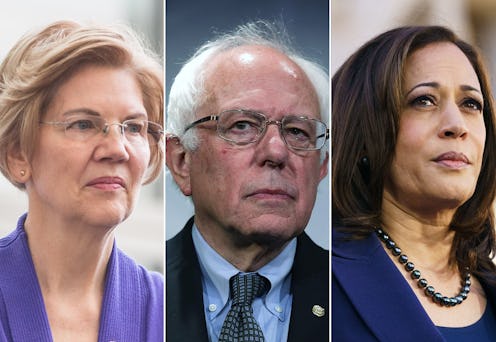News
Democratic Candidates Are Talking About Reparations All Wrong

In this op-ed, writer Nylah Burton explains how Democratic candidates' comments about reparations often miss the mark.
The idea of paying reparations for slavery recently entered the debate among 2020 Democratic presidential candidates, and while it’s encouraging to finally see reparations as part of our political dialogue, most of the presidential hopefuls don’t seem to understand what actually qualifies as reparations.
While Julián Castro said he would establish a “task force” to determine what form reparations would take, and self-help author Marianne Williamson pledged to dedicate $100 billion toward reparations payments to Black Americans, they’re the outliers. Several of the more well-known Democratic presidential candidates have chosen to talk up social programs that would benefit Black people as well as other Americans, rather than call for direct payments to individuals.
Like many Black Americans, my family endured enslavement and segregation in the Deep South. This came with whips, lynchings, rape, and forced labor. Many people like to view the struggles of the Civil Rights era as a thing of the past, but my family still feels the effects of slavery and Jim Crow today. Most of them live in crushing poverty. I want them to have access to social programs that will improve their lives, but it’s also important that the government that oppressed my family formally recognizes that oppression. It’s important that our autonomy is honored, and that we’re able to use reparations to build wealth in whatever way we see fit.
It’s easy to see why candidates shy away from backing direct payments. The idea of reparations has always been intensely unpopular, and the idea of providing direct payments or assets to individuals even more so. According to a 2016 Point-Taken Marist poll, 68 percent of Americans overall, and 81 percent of white Americans, oppose payments to the descendants of slaves. While people of color and millennials are more likely to support such payments, the fact remains: It is a deeply controversial and divisive topic.
That divisiveness is reflected in the statements the Democratic presidential hopefuls have made about redress for slavery. In what some may view as a break from his otherwise liberal policies, Sen. Bernie Sanders (I-VT) has flat-out dismissed the feasibility of monetary reparations, telling CNN anchor Wolf Blitzer that “just writing out a check” to individuals wouldn’t be helpful. He went on to elaborate that in his view, any form of reparations needed to focus on “distressed communities” that suffer from poverty.
Reparations cannot be colorblind when the original crime wasn’t colorblind.
Meanwhile, Sens. Kamala Harris (D-CA) and Elizabeth Warren (D-MA) both expressed support for reparations via widespread social programs, of which descendants of the enslaved wouldn’t be the sole beneficiaries. Harris supports reparations through the LIFT Act, which provides a tax credit to all families making $100,000 per year or less. Warren proposed social programs addressing housing practices, telling Reuters that she would “provide help to minorities in making a down payment on a home.”
But such social programs aren’t enough. We desperately need these programs, it’s true; but calling them reparations is a slap in the face to the descendants of the enslaved like me. As a nation, we all need things like free health care, child care, and education. We all need affordable housing, healthier food options, and environmental reform. But suggesting that providing those things amounts to reparations is an insult.
Many people, regardless of race or background, are struggling in the United States. But only the descendants of the enslaved deserve reparations for what was the largest forced diaspora in human history and one of the most inhumane systems of forced labor the world has ever seen. Reparations cannot be colorblind when the original crime wasn’t colorblind.
Without reparations in the form of money or assets, how can we ensure that every Black American is able to benefit? Not all Black Americans need social programs, but all Black Americans are entitled to reparations, as Ta-Nehisi Coates explained in heartbreaking detail five years ago.
The truth is that no form of reparations will fully right the wrongs of slavery. But that’s not the point. The point is to acknowledge a crime against humanity and to make one step toward redress. Our country needs better social programs, but we also need true reparations. It’s revolutionary to have so many candidates discussing this controversial topic. But that doesn’t mean that we can’t push them to have these conversations more effectively.